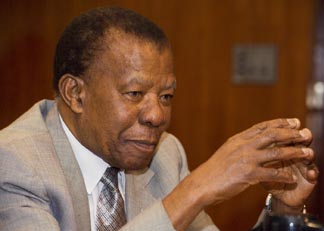Former president of Botswana offers keys to Africa's most successful democracy
By Alex Kwan

ITHACA, N.Y. -- In southern Africa, a region once associated with apartheid, and now with corruption and disease, Botswana is an example of what is possible: a well-governed country sustained by rapid economic growth. Much of that country's success is owed to Sir Quett Ketumile Joni Masire, former president of Botswana and a central figure in that country's remarkable transformation from British colony to multiparty democracy.
Talking about the development of sustainable leadership in Africa as part of the Institute for African Development's Special Speaker Series Oct. 31, Masire began by listing Botwana's five founding principles: democracy, development, self-reliance, national unity and social justice.
These founding principles are the backbone of Botswana's constitution, a blend of cultural tradition with modern democracy. "None of us had experience with democracy, either as voters or leaders. We faced a monumental task," said Masire, who remembers many critics of the new government. Priorities were set on such necessities as education, clean water, roads and agriculture, but the country needed financial support from the private sector.
Masire's prominent role in African politics is in large part due to his success in improving the social and economical conditions in Botswana, which gained its independence from Britain in 1966. He served throughout that transition as vice president from 1966 to 1980 and president from 1980 to 1998. Over the past three decades, Botswana's per capita income has grown at rates comparable to those in countries like South Korea and Thailand. Moreover, the country's democratic government is a rarity on the turbulent continent. "Botswana is regarded as the oldest democracy in southern Africa," said Masire.
Early in its independence, Botswana adopted a strategy to attract foreign interests through its natural resources. Large copper and diamond deposits provided much-needed taxable income. Masire recalled an important negotiation with tribal chiefs that gave mineral rights to the whole country. "Fortunately, beforehand no minerals were known to exist in Botswana, so everybody agreed," said Masire. Botswana has since become one of the world's largest diamond suppliers.
In his concluding remarks, Masire urged others to join him in an effort to remove the perception of Africa as "a hopeless continent." He listed six goals: civil order, conflict resolution, human rights, health and education investment, improved trade and economic diversification and the adaptation of new technology, especially for combating such diseases as HIV/AIDS, malaria and tuberculosis. At a press conference earlier in the day, Masire cited the future establishment of an AIDS testing laboratory in Botswana by an American nongovernmental organization as an example of such progress.
In a question-and-answer session, Masire was asked about the stability of Botswana, especially in the face of totalitarian regimes in neighboring countries. Masire described his country as "an island of peace surrounded by minority regimes" and pointed out that Botswana handled many refugees, including prominent leaders like Nelson Mandela. Mandela found temporary asylum in Botswana prior to his trial in South Africa in 1964, when he was sentenced to life in prison on charges of sabotage. "It was a delicate exercise to handle that responsibility," said Masire, who commended Botswana for holding onto its founding principles.
Masire was also asked to give advice for other developing African nations. "I wish I could, but every country has its own personality," said Masire, who maintained there is no single winning strategy except to govern according the principles. "We were very cautious from the onset on how we would change the country," said Masire, who also warned that HIV/AIDS could be the greatest challenge for Botswana in the future.
Born in southern Botswana and a former school headmaster, Masire was also a co-founder of the Botswana Democratic Party and has also been an active leader in humanitarian and peacekeeping efforts, such as serving as chair of the Organization of African Unity's (OAU) committee that investigated the 1994 genocide in Rwanda and as principal mediator in the 2002 peace talks to end civil war in Congo. He has also served as chair of the Southern Africa Development Community (SADC) in the early 1980s, as the first vice chair of the OAU and a co-chair of the Global Coalition for Africa.
Masire was introduced by David Wippman, the vice provost for international relations.
Alex Kwan is a writer intern at the Cornell News Service.
Media Contact
Get Cornell news delivered right to your inbox.
Subscribe